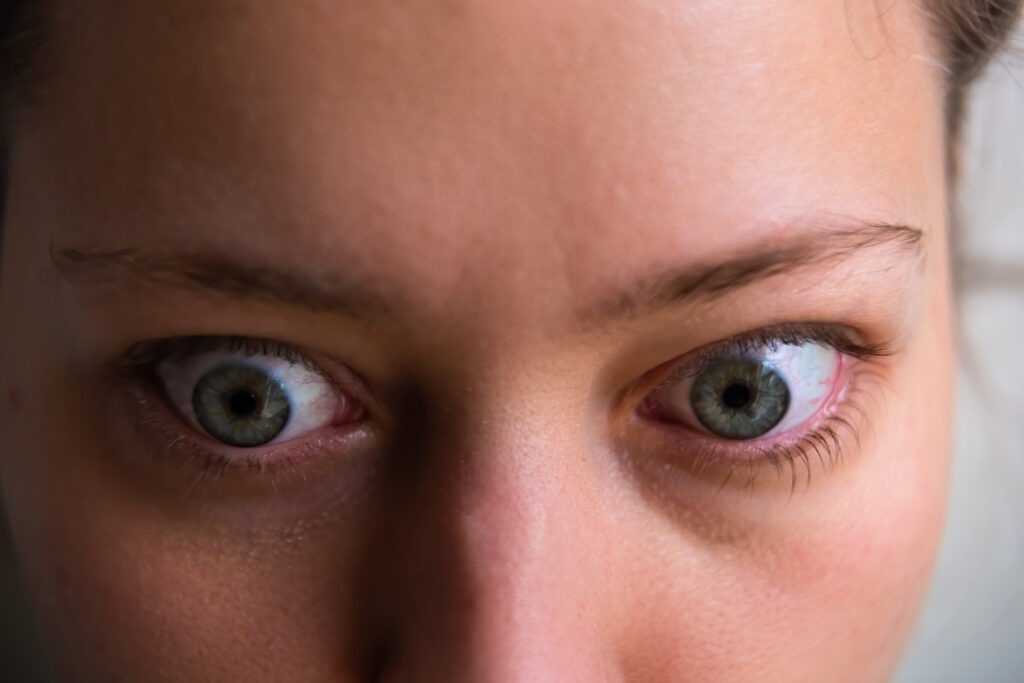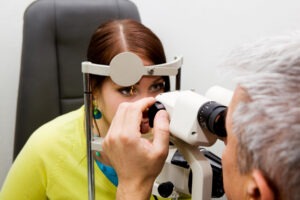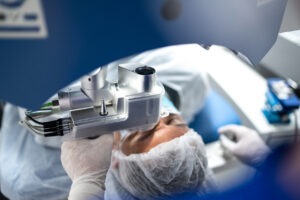
If you have been diagnosed with thyroid eye disease, then you are probably wondering what your treatment options are, and whether you can trust your doctor’s judgment.
Treatments for TED
A variety of treatments for TED have been used and you should talk to your doctor about what is best for you. If you feel you are being pressured into Tepezza or a more invasive treatment, consider getting a second opinion. For many patients, TED will go away once the underlying thyroid issue is treated.
Treatments include:
Quitting Smoking and/or Vaping
Smoking can make TED worse and can cause treatments for hyperthyroidism to work less well. You should do your best to quit smoking as soon as possible. Talk to your doctor about a cessation program. While some people switch to vaping as a safer option, there is no research to indicate that it is safe and it is still poor for your general health.
Properly Managing Your Hyperthyroid
While you may still experience TED if properly treated for Graves disease, proper treatment and managing your thyroid levels can help prevent TED from developing, mitigate symptoms, and help your eyes recover.
Avoid radioiodine treatment, which can make TED worse, especially if you smoke.
Selenium
A six month course of 100mcg selenium supplements, taken twice daily, can help people with mild TED. Talk to your doctor before taking a supplement as it may interact with some of the medication you are on. Selenium can be purchased over the counter.

However, this treatment appears to be most effective if you live in an area with selenium-poor soil, indicating that it might be a deficiency in selenium making symptoms worse rather than supplemental selenium making them better.
Artificial Tears
If you experience dry, gritty eyes as a result of TED, you may benefit from using artificial tears. You can get drops, gels, or ointments, although the ointments are typically used as night as they can blur your vision. You may need to try more than one type to get the right treatment for you.
Steroids
While steroid treatments do not reduce protrusion of the eyes, they can reduce inflammation and help your eyes move more freely. They also reduce redness and swelling and can help your eyesight improve. Typically, prednisone is the medication of first choice.

Spectacles
You can sometimes get relief from double vision by wearing spectacles with prisms attached, which help correct the doubling. Your optician will help design the prisms.
Other patients may benefit from wearing sunglasses to help protect your eyes from light. Some might wear an eyepatch temporarily, this helps reduce double vision.
Surgery

If your hyperthyroidism is under control and your eyes have “settled down” but you still have significant symptoms, or if your symptoms are severe and affecting your vision, surgery may be recommended
There are three types of surgery considered:
- Orbital decompression surgery. This removes the bone between the eye socket and sinuses, which gives your eyes enough space to return to their normal location. This is only recommended if other treatments have failed or if you have pressure on your optic nerve causing vision loss.
- Motility surgery. This repositions muscles around the eyes to help reduce double vision.
- Eyelid surgery to improve the position of the eyelids, helping your appearance and reducing your risk of eye injury.
Orbital Radiotherapy
Radiation therapy has been used for a long time to treat thyroid eye disease. It helps modulate your immune system and can reduce proptosis. Recent studies have shown that a lower dose is equally effective, especially in smokers, people assigend female at birth and people who’s thyroid levels are stable. Treatment is most effective if administered within 6 months of developing symptoms.
Orbital radiation is often used in conjunction with steroids and allows you to stop taking steroids faster. Short-term risks are minor, but orbital radiotherapy does increase your risk of cataracts and can cause or worsen dry eye.
Therapy
Because TED can cause changes in appearance that may not always be reversed, many people with it experience depression and emotional distress. Psychotherapy can help you deal with these changes and improve your quality of life. This can also improve your confidence and help reduce psychosocial impacts and even make it easier to get a job.
Other Natural Treatments for TED
A few other natural and lifestyle treatments have been shown to work well. These include:
- Using a cold cloth or towel on your closed eyes to ease pain and swelling.
- Elevating your head slightly when you sleep, using extra pillows or rolled up towels. This helps keep fluid from building up and reduces the risk of waking up with swollen eyelids.
- Wear a plastic wrap dressing over your eyelids at night to hold them closed and keep your eyes from drying out.
- Eating a healthy diet and getting regular exercise.
- Meditation and mindfulness.
If you have thyroid eye disease, you don’t have to take a poorly tested drug that has proven to be dangerous to some people. Rather, there are other options, some of them completely natural, to help you deal with your symptoms. Be sure to advocate for yourself with your doctor, but also tell your doctor about what natural treatments you are using so you can work together.
What is Thyroid Eye Disease?
Also called TED, Graves Eye Disease, Graves’ orbitopathy or Graves’ ophthalmopathy, thyroid eye disease affects about one in three people with Graves’ disease, a form of autoimmune hyperthyroidism.
If you have TED, then your immune system starts to attack the tissue surrounding one or both eyes, causing the tissue to become inflamed. This results in the eyes bulging outwards.
In rare cases, you can have an autoimmune disease affecting your eyes without having Graves disease. Treatment for Graves disease does not always prevent TED.
What Are the Symptoms of TED?
The symptoms of TED vary from mild to severe. They include:
- Staring or bulging eyes.
- Watery eyes.
- Reduced tolerance for bright lights and glare.
- Swelling of the eyelids or a feeling of fullness.
- Dry, gritty eyes.
- Bags under the eyes that are not associated with lack of sleep or normal for you.
- Redness of lids or eyes.
- Double or blurred vision.
- Pain in or behind the eye, particularly when looking down, up, or sideways.
- Difficulty moving the eyes.
- Difficulty closing the eyes, which can increase the risk of injury.
These symptoms are sometimes mistaken for allergies/hayfever or conjunctivitis. TED does not typically cause itchy or sticky eyes. Puffy eyelids associated with underactive thyroid are not TED and typically resolve when your thyroid replacement dosage is correct.
How is TED Diagnosed?
TED is diagnosed by two basic means. The first is that if thyroid eye disease is suspected and your thyroid levels have not been checked, your doctor will typically order a blood test to check your thyroid levels. This can help distinguish TED from other diseases with similar symptoms. Another factor is to eliminate other diseases. For example, hayfever can be eliminated as TED-related symptoms last beyond your allergy season.
An eye exam will also be conducted. Your ophthalmologist will test your visual field and color vision and measure how much your eye bulges. They may also order a computed tomography (CI) or magnetic resonance imaging (MRI) scan of your eye sockets and eye muscles.
In some cases, TED goes undiagnosed because it is confused with other diseases. If you have hyperthyroidism and any eye symptoms, it’s important to advocate for yourself with your doctor or eye doctor and make sure that they check your eyes properly for TED.
Can TED Affect Your Quality of Life?
A recent study indicates that thyroid eye disease significantly affects your quality of life, even once it is stable. Quality of life is negatively affected by both vision-related and appearance-related issues. Bulging eyes can be visible to others and can result in depression and lower self esteem. People also report psychosocial impact that includes anxiety and difficulty getting a job. The negative reactions of others can significantly affect quality of life, even if your vision is not or minimally affected.
Is There an FDA Approved Drug to Treat Thyroid Eye Disease?
Yes. The drug, approved in 2020, is called Tepezza. However, Tepezza has been associated with some adverse effects, possibly connected to the way is FDA approval was fast-tracked. The FDA sometimes rushes approval on drugs if there is no good treatment and while much of the time this works, in the case of Tepezza (teprotumumab-trbw) some serious side effects were missed in the original, fairly small study.
In some cases, the hearing loss from Tepezza can be profound and permanent. For many people, the side effects from the drug turn out to be worse than the symptoms of TED.
If you have taken Tepezza and experienced hearing loss or tinnitus, contact the Tepezza Lawsuit Attorneys of Nadrich Accident Injury Lawyers today to see if you qualify for compensation. Contact our office to find out more.

